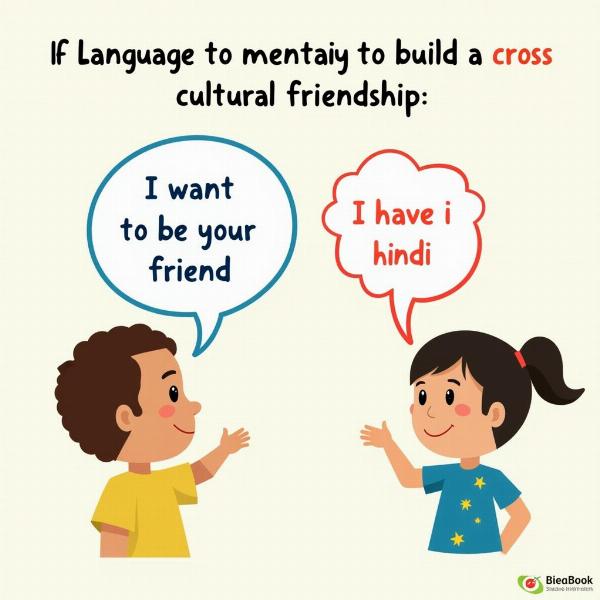Understanding how to express the desire for friendship in Hindi can enrich your interactions and help build genuine connections. “I want to be your friend” conveys a simple yet powerful sentiment, and knowing its equivalent in Hindi allows you to communicate this directly. This article explores various ways to say “I want to be your friend meaning in Hindi”, delving into the cultural nuances and offering practical examples to help you navigate social situations with confidence.
Different Ways to Express “I Want to Be Your Friend” in Hindi
Expressing the desire for friendship varies depending on the context and the level of formality. Here are some common ways to say “I want to be your friend” in Hindi:
- Main aapka dost banna chahta hoon (मैं आपका दोस्त बनना चाहता हूँ): This is a formal and respectful way to express your desire for friendship, particularly suitable when addressing someone older than you or someone you hold in high regard.
- Main tumhara dost banna chahta hoon (मैं तुम्हारा दोस्त बनना चाहता हूँ): This is a more informal phrasing, appropriate for peers or people you are closer to.
- Kya hum dost ban sakte hain? (क्या हम दोस्त बन सकते हैं?): This translates to “Can we be friends?” and is a gentle, less direct approach. It’s a good option when you’re unsure about the other person’s feelings.
- Dosti karoge? (दोस्ती करोगे?): This is a very informal and friendly way of asking “Will you be my friend?”, commonly used among young people.
- Chalo dost ban jaate hain (चलो दोस्त बन जाते हैं): This translates to “Let’s become friends” and suggests a proactive approach to initiating a friendship.
Understanding the Cultural Context
Indian culture places a high value on relationships and friendships often develop into deep, lifelong bonds. Expressing your desire for friendship is therefore seen as a positive gesture. However, it’s important to be mindful of the social hierarchy and choose your words accordingly. Using the formal “aapka” (आपका) shows respect while “tumhara” (तुम्हारा) is reserved for closer relationships.
Practical Examples and Scenarios
Let’s explore some real-life scenarios where expressing the desire for friendship in Hindi would be appropriate:
- Meeting someone new at a social gathering: “Kya hum dost ban sakte hain?” (क्या हम दोस्त बन सकते हैं?) is a polite and approachable way to initiate a potential friendship.
- Connecting with a classmate: “Main tumhara dost banna chahta hoon (मैं तुम्हारा दोस्त बनना चाहता हूँ)” is suitable for building camaraderie with a peer.
- Approaching a senior colleague: “Main aapka dost banna chahta hoon (मैं आपका दोस्त बनना चाहता हूँ)” conveys respect and a desire for a friendly professional relationship.
Why Knowing This Phrase is Important
Learning to express “I want to be your friend meaning in Hindi” is invaluable for several reasons:
- Building connections: It enables you to directly express your desire to connect with others, fostering stronger relationships.
- Cultural understanding: It demonstrates your respect for Indian culture and your willingness to engage with it.
- Improved communication: It expands your vocabulary and allows you to communicate more effectively in Hindi.
Building Lasting Friendships
While knowing how to say “I want to be your friend” is a great start, nurturing a lasting friendship requires effort and understanding. Be genuine, respectful, and mindful of cultural sensitivities. Showing a genuine interest in the other person’s life and culture will go a long way in building a strong bond.
 Language and Friendship
Language and Friendship
Conclusion
Expressing “i want to be your friend meaning in hindi” effectively can significantly enhance your social interactions in India. By understanding the nuances of the language and culture, you can build genuine and lasting connections. So, go ahead and try using these phrases – you might be surprised at the warm welcome you receive.
FAQ
-
What is the most formal way to say “I want to be your friend” in Hindi?
- “Main aapka dost banna chahta hoon (मैं आपका दोस्त बनना चाहता हूँ)” is the most formal expression.
-
Can I use “tumhara” (तुम्हारा) with anyone?
- It’s best to use “tumhara” (तुम्हारा) with peers and people you are close to. Using it with elders might be considered disrespectful.
-
Is it common to express the desire for friendship directly in India?
- Yes, expressing the desire for friendship is generally seen as a positive gesture.
-
What is the significance of using respectful language in Indian culture?
- Respectful language is highly valued in Indian culture and demonstrates good manners and consideration for others.
-
What are some other ways to strengthen friendships in India?
- Showing genuine interest, participating in cultural events, and offering support are excellent ways to strengthen friendships in India.
Meaning-Hindi.in is your trusted partner for all your Hindi translation needs. We offer a comprehensive range of services, from business and legal document translation to website localization and specialized translations. We understand the cultural nuances and linguistic intricacies of Hindi, ensuring accurate and culturally sensitive translations. Contact us today for all your translation needs at email: [email protected] or phone: +91 11-4502-7584. Meaning-Hindi.in offers expert translation services that bridge language barriers and connect you with the Hindi-speaking world.